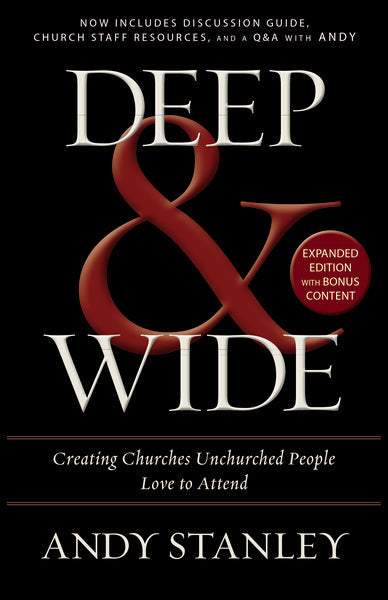by Andy Stanley, adapted from his new book Deep & Wide, Expanded Edition.
The key to successfully engaging unchurched people in a weekend message has more to do with your approach and your presentation than your content.
If you’ve ever heard me, you know that in just about every message I push the audience to read the Bible for themselves. I’m constantly saying things like, “Can you believe that’s in here? You should read your Bible.” I try to remove excuses. I remind them, “You don’t have to believe it’s inspired to read it.” I’ll even taunt when necessary: “Don’t avoid the Bible because you don’t believe it all. You don’t read anything because you believe it all. Infallibility is not your litmus test for reading material, is it?” I’m not above saying things like, “You should read the Bible so you will have more moral authority when you tell people you don’t believe it. Don’t be like the kid who says he doesn’t like string beans but never tasted them. Come on! What are you afraid of?”
Now, if all that makes you wonder why any unbeliever in his right mind would ever darken the door of one of our churches, much less come back a second time, it’s because there’s something important you’ve missed along the way. When people are convinced you want something FOR them rather than something FROM them, they are less likely to be offended when you challenge them. Remember your favorite coach? The one who was hard on you, but got the best out of you?
Ultimately, I want people to fall in love with the Author of the Scriptures and his Son. But I don’t have any control over that. So my best option is to arrange the date. I figure if I do a good job, even if they don’t fall in love on the first date, there is always the possibility that something will happen on the second or third date. Heck, I meet people who’ve been attending our churches for several years that say they aren’t there yet. Nothing I can do about that except to continue arranging dates. As long as they are sitting under the proclamation of the gospel, there’s hope!
My Approach
My approach is to entice the audience to follow me into one passage of Scripture with the promise that the text is either going to answer a question they’ve been asking, solve a mystery they’ve been puzzled over, or resolve a tension they’ve been carrying.
Begin with the Audience in Mind . . . not your message.
Great communicators take people on journeys. Where a communicator begins the journey determines who will follow. If your desire is for unchurched attendees to follow, you may need to take several steps back from where you normally begin.
This is my intent when I say my approach is to entice the audience to follow me into a passage. Before I take people to the text, I want them to be thinking, Oh my gosh. I’m glad I came today. I do that by creating tension. The tension in a text is usually found in the answer to one or more of the following questions:
- What question does this text answer?
- What tension does this text resolve?
- What mystery does this text solve?
- What issue does this text address?
Before I draw people’s attention to a solution, I want to make sure they are emotionally engaged with the problem. If the text answers a question, I dare not go there until everyone in the audience really wants to know the answer. The mysteries, questions, and tensions we all wrestle with serve as the common ground for believers and unbelievers.
If you want non-Christians to engage with you on your journey, begin at the place where all of us shrug our shoulders and say, “I don’t know, but I wish someone would tell me.”
This isn’t hard. Actually, it’s quite easy. Contrary to what you might have been told, or otherwise believe, we have far more in common with unchurched people than we have differences. We all worry about the same things. None of us feels like we have enough money. Every married couple faces similar challenges. We all wonder what happens when we die. Parents are concerned about their children’s friends.
We all need friends. We all face overwhelming temptations. We all have regrets we don’t know what to do with. We’ve all been hurt. We struggle to forgive. We are plagued by guilt. Honestly, I can’t think of a single uniquely “Christian” problem. There are just problems. Which means there is fertile common ground everywhere we look. That’s where we must begin.
Where do you begin?
— Andy Stanley, Deep & Wide, Expanded Edition. This just scratches the surface of what Andy calls “Double-Barrel Preaching.” Discover more in the book Deep & Wide.
How to Use This Book
This new, expanded edition of Andy Stanley’s bestselling and award-winning Deep & Wide gives you an in-depth strategy for preaching and programming to “dual audiences”: mature believers and cynical unbelievers. The bonus content in this expanded edition includes discussion questions, church staff resources, and a Q&A with Andy.
“No Christian leader can afford to miss this book.” –Rick Warren

